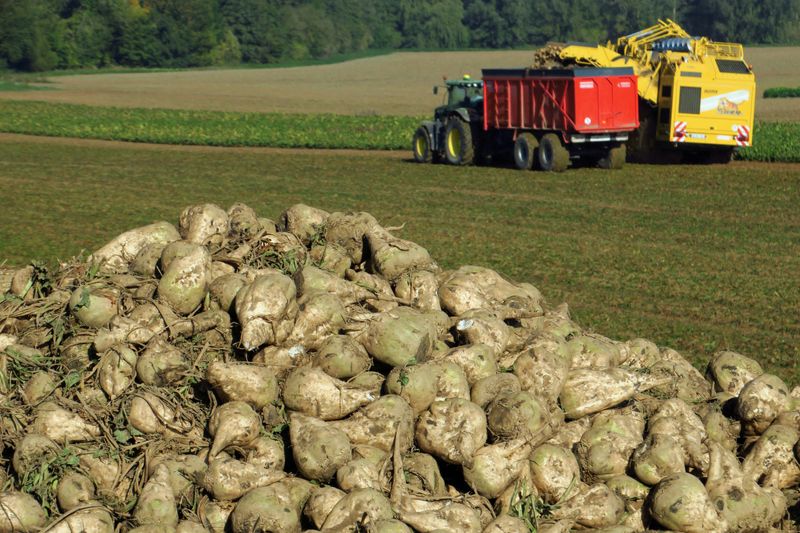By Maytaal Angel and Gus Trompiz
LONDON/PARIS (Reuters) - Europe's sugar beet growers are turning away from the crop in a move that could drive soaring prices even higher, as the EU's environmental rules clash with its bid to stem food inflation and secure supplies.
Farmers are switching crops after the European Union's top court ruled in January they can no longer be granted exemptions to a ban on so-called neonics - insecticides which protect against diseases like virus yellows in sugar beet but are toxic to bees and other pollinators vital to food production.
The ruling, which the bloc and environmental groups say is critical for safeguarding pollinators, some of which are currently threatened with extinction, has led to a cut in acreage devoted to sugar beet as crop yields suffer, farmers and industry experts told Reuters.
"In our region, we lost 15% of the (sugar beet) area (this year)," said Alexandre Pele, who has a 240 hectare farm in central France.
"I have struggled to meet volume commitments with the sugar factory because my yields have declined notably due to the ban on neonicotinoids," said Pele.
The EU is the third largest sugar producer in the world so a reduction in output could impact soaring global prices and frustrate efforts to bring food inflation down.
"We’ve entered a new paradigm in sugar, low prices are a thing of the past," said an analyst at one of the world's largest sugar traders. "Global stocks are low, demand is growing and supply is vulnerable all over the world due to climate change, due to the difficulty expanding production anywhere, not least Europe."
EU sugar prices are at their highest ever levels, roughly double prices seen two years ago, driven partly by an increased reliance on costly imports as the local sugar sector shrinks.
The European Commission expects sugar imports to have risen about 60% in the current season. The bloc relies on imported sugar, mostly subject to duties, for about 15% of its needs.Neonicotinoids were banned in Europe on non-flowering crops like sugar beet in 2018, but after a 2020 attack of virus yellows crushed output in France and Britain, EU member states granted temporary exemptions.
Since January's court ruling banning exemptions, the area devoted to growing sugar beet in France, the EU's largest sugar grower, has hit a 14 year low.
The European Commission said it expects the entire EU beet area to fall some 3% below a five-year average this year due to the ruling. The EU beet acreage has already fallen 17% percent since the 2018 neonics ruling, EU data shows.
The acreage fall led the world's second largest sugar producer Tereos to close a factory in northern France this year, losing 123 jobs. Tereos said at the time it was expecting to receive 10% less beet from farmers.
French grower Pele said he hasn't yet reduced his sugar beet crop because of the investment he's already made, but the yield from one of his plots is down by 45% this year.
One in 10 bee and butterfly species, critical for safeguarding biodiversity, are currently threatened with extinction, and environmental groups along with the EU pin much of the blame on neonics.
"The harm of neonics to pollinators is undeniable. They are the most studied pesticide in human history, and we know very well how they work," said Noa Simon Delso, scientific director at Beelife, a Brussels-based non-profit organisation.
Several seed makers, including Germany's KWS Saat are working on new sugar beet varieties that would be naturally resistant to virus yellows, but farmers say they may not be available until 2027.
By this time, those who have left the sector and sold costly equipment might be loathe to return.
"Consumers will have to appreciate if more constraints are put on farming, for good reason or not, the costs of production will increase until we find other methods to cultivate this food," said Andrew Blenkiron, who runs a 7,000 acre farm in the east of England, which thanks to Brexit, can use neonics this year.
He said he would move away from beet if he can't protect his crop.
"It's a dilemma - producing food at a cost effective price while ensuring we have good environmental protection," he added.
A shrinking sugar beet sector could hit other staple crops because farmers need to plant alternates like sugar beet or oilseeds on their wheat, barley and corn fields every other year in order to maintain soil health.
Oilseeds were one of the first crops targeted by the ban in late 2013, and rapeseed production has since fallen 12%.
"If I lose a crop like sugar beet, that's an agronomy (crop rotation) issue but also, because weather threats are multiple these days, having a number of crops allows me to better manage risk," said Pele. "If I no longer have sugar beet it would be a real loss."
